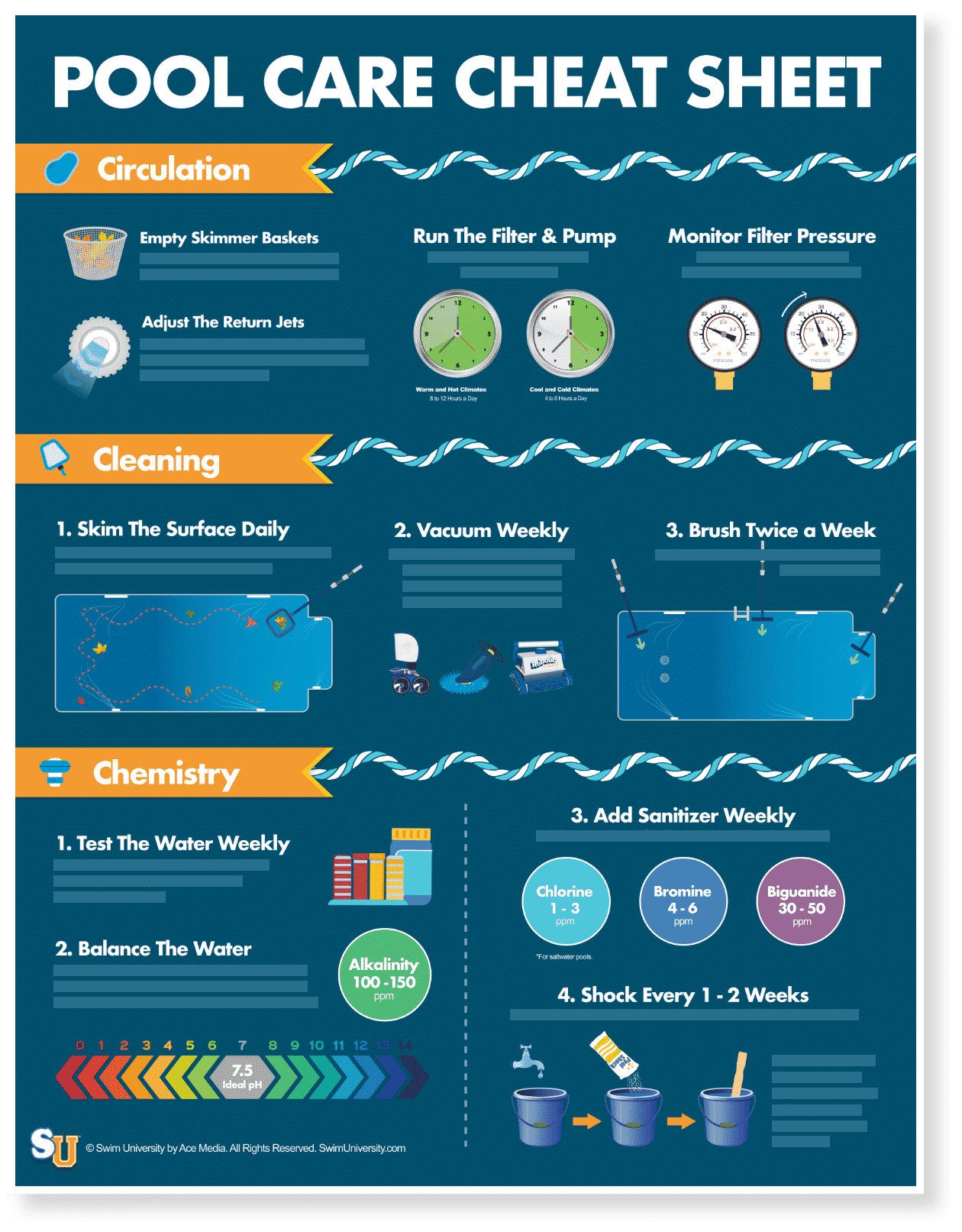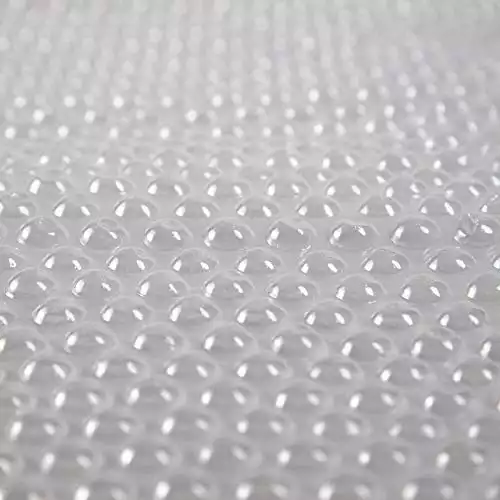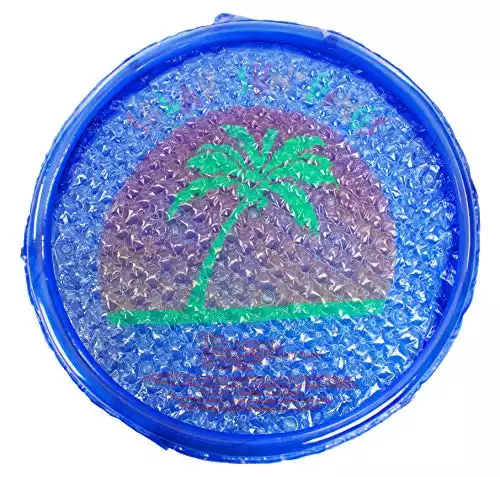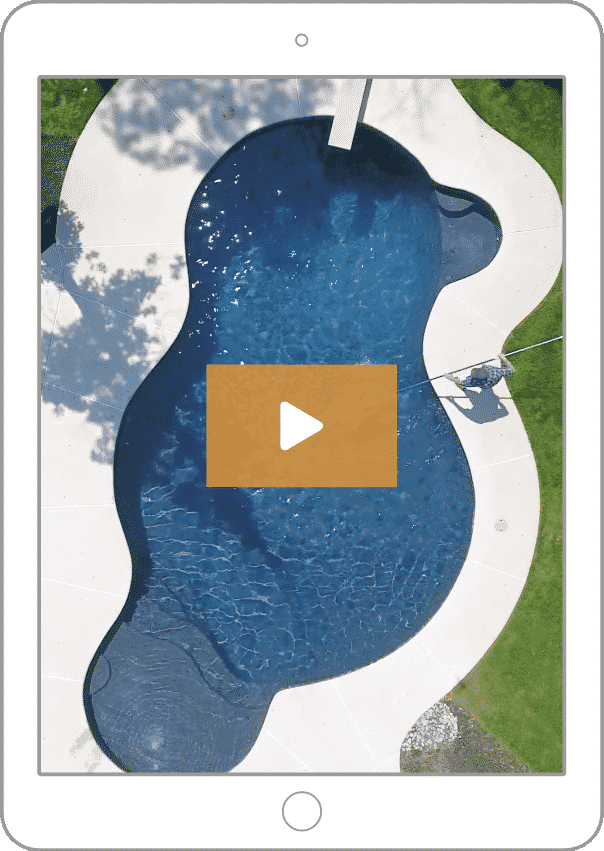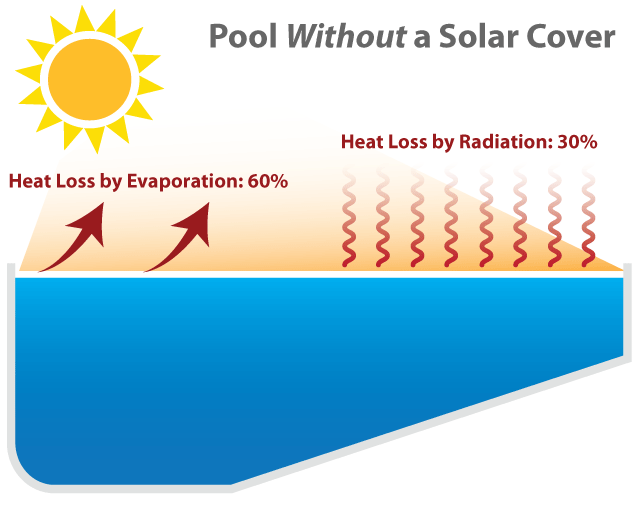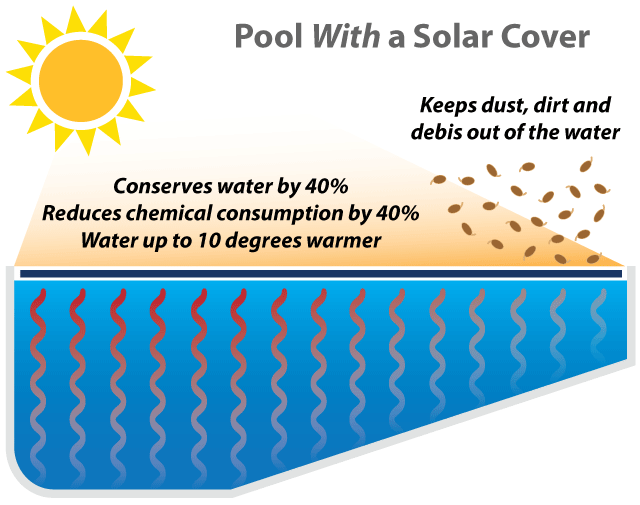Unless you’re one of those adventurous polar bear people who like jumping into ice-cold water, you probably want to keep your swimming pool heated. But before you run out and drop the dough on a traditional electric or gas heater, have you considered a solar pool cover?
A solar cover can raise and hold the water temperature of your inground, above ground, or Intex pool. It’ll also reduce your energy costs, minimize water loss, increase heat retention, and in some cases, even decrease chemical needs.
What is The Best Solar Pool Cover?
There are three types of solar covers: blankets, rings, and liquid. Here are our top picks for all three.
NOTE: These solar pool covers are available to buy on either Amazon and InTheSwim.com. Check both sites for availability. All the links are affiliate links which means if you click a link and make a purchase, we earn a commission at no additional cost to you. It helps us keep the lights on 💡
For a classic solar cover that’ll not only heat your pool but will also help reduce water and chemical evaporation at night, we like this lightweight clear solar cover. Perfect for both inground and above ground swimming pools.
This solar blanket will increase the water temperature by about 15 degrees and prevent up to 95% of pool water and chemical evaporation. This reduction of evaporation is environmentally friendly, save you time, and money. Comes with a 6-year manufacturer warranty.
If you get a lot of sun during the day, but lose heat due to colder temperatures at night, then you can use a liquid solar cover. This chemical adds a microscopic layer on your pool water surface that you can’t see or feel. And if you keep your filter system off at night, it’ll help reduce water evaporation helping you to retain the heat you gain during the day.
Yes, liquid solar covers actually work and quite well. While they don't attract the sun's heat to your pool water, they help reduce water evaporation at night to keep the heat in your water.
And finally, if taking a full solar cover on and offer your large pool is too much of a pain (and you refuse to get a solar reel), then you can use solar rings. Just toss these round discs on your pool when you’re not using it to help gain and retain heat.
Solar rings are perfect for quick pool heating during the hottest months. They're easy to take on and off your pool and help reduce water evaporation and chemical use.
What is a Solar Pool Cover?
With no cover at all, pool water absorbs a substantial amount of sunlight. A white plaster pool averaging 4.5 feet in depth absorbs approximately 60% of the sun’s energy. This energy will heat the pool by about 0.7°F per hour under the noontime sun.
But this heat gain is counteracted by water evaporation, which is dependent not only on water and air temperature but also wind on the pool’s surface and humidity. Evaporation would cause the same pool to lose about 5°F for every ¼-inch of water evaporated.
Solar pool covers capture the energy of the sun and transfer it directly into your pool water to keep it warm. Depending on where you live, a solar cover may not keep the water as warm as an electric or gas heater, but the tradeoff is that it can actually save you money by reducing water evaporation.
Before we continue, are you tired of fighting with your pool? You’re not alone. Most people are frustrated by their pools because they don’t know what to do or how to fix it when something goes wrong. Our comprehensive illustrated guide and video lessons will show you exactly what to do so you can get back in the water fast. Click here right now and purchase our Pool Care Video Course today!
Frustrated by adding chemicals and trying to keep your pool clear all the time?
We cut out all the confusion of pool maintenance in this easy-to-read illustrated ebook and video course. It'll help you save $100 right away on pool care!
Click Here to Learn MoreDo Solar Pool Covers Really Work?
Yes! Every time you lose water, through splashing or evaporation, you have to replace it. And new water takes energy to heat. Solar pool covers help retain the heat already in the water by reducing water evaporation. And they act as a magnifying glass to amplify the sun’s warming effect on your pool water.
What Is The Best Color for a Solar Pool Cover?
Solar pool covers are available in several thicknesses. They’re measured in mil, which is the standard United States unit of measure for one-thousandth of an inch.
- Blue solar covers can measure 4 mil (very weak – lasts about 1 year) and 8 mil (heavy-duty – lasts 1 to 2 years).
- Clear solar covers can measure 12 mil (heavy-duty – lasts 3 to 4 years) and 16 mil (strongest and most durable – lasts 5 to 10 years).
Clear solar covers heat the pool better than blue solar covers because they allow more of the sun’s heat to penetrate more efficiently. Dark blue solar covers are great for heat retention. And even a lightweight cover can last if you take care of it properly.
What Is The Best Thickness for a Solar Pool Cover?
After testing, we found that any solar pool cover between 12-mil and 16-mil performed best for heat retention. Higher mil solar covers absorbed more heat and were found to be more durable against the sun damage, chemical resistance, and ripping.
This solar blanket will increase the water temperature by about 15 degrees and prevent up to 95% of pool water and chemical evaporation. This reduction of evaporation is environmentally friendly, save you time, and money. Comes with a 6-year manufacturer warranty.
How Much Do Solar Pool Covers Cost?
Solar covers are usually fairly inexpensive, but you can spend a little more for a higher-quality option. Most solar covers cost between $75 – $225. And don’t worry if you have a unique pool shape—you can trim a solar blanket to perfectly customize it to your pool.
How to Use a Solar Pool Cover
The first time you unpack it, a solar blanket may be a little unwieldy, but it’s easily fixed. First, unfold it next to the pool. Spread it out bubble-side down on top of the pool water. The bubbles keep your cover afloat while, depending on the color and type of cover, acting as little magnifying glasses to heat up your pool.
Straight out of the box, the solar blanket will probably hang out over the sides of your pool, especially if you have a uniquely shaped pool. Use multi-purpose scissors to trim the excess so the blanket fits inside the pool.
Tip: Leave a flap 2 to 3 inches long where your skimmer is so you can tuck it under the edge of the skimmer. This allows you to push debris into the skimmer before removing the blanket.
Ideally, you’ll put your solar blanket on whenever the pool is not in use. Daytime is the best time for it to heat up your water, of course, since it relies on the sun. However, keeping it on through the night prevents water and heat loss via evaporation.
Tip: Running your pump while your solar blanket is on is completely safe.
If you’re in and out of the pool throughout the day, just be sure to put it back on when you’ve finished using the pool for the day. Obviously, you’re not going to want to swim with a solar blanket on the pool, so before you get in, you’ll need to remove it.
How to Remove a Solar Cover From Your Inground or Above Ground Pool
If you have a large pool, or if you swim often, removing the solar blanket every time you want to use your pool can be quite a chore. One solution is to cut the solar blanket into smaller panels so you can remove the pieces one at a time. If you’d rather not cut the blanket up, a convenient alternative is a solar cover reel.
Good for both inground, above ground, and Intex pools, the solar reel is placed at one end of the pool. You’ll attach one end of the solar blanket to the reel, and then turn the handle or wheel. The blanket will be spooled onto the solar reel, saving you a lot of hard work.
Some solar blanket reels are available with wheels, so you can roll up your cover and then move the solar reel aside. Others come with mounting hardware to install permanently in one location. Which version works best for you will depend mostly on how much space you have around your pool.
If you don’t have a solar reel, you can pull the cover off and “accordion fold” it. Pull about four feet out, then fold that section in half. Continue pulling two-foot sections, folding each one back and forth like an accordion. This method also lets you rinse off each small section before folding, if needed.
Important: It’s very important that you always remove a solar blanket from the pool before allowing anyone to swim, especially small children and pets. Partially removing it or folding it back isn’t enough. It’s possible for them to become trapped under the blanket. It must be completely removed to avoid this risk.
Tip: If you remove the solar blanket temporarily, be sure to keep it covered or in the shade to prolong its life.
How to Properly Store Your Solar Cover
At the end of pool season, it’ll be time to break out the safety cover, and store the solar blanket. But before you do that, you must make sure the solar blanket is clean and completely dry so you don’t get a nasty, moldy surprise when you open it up next season.
To clean your solar blanket, remove it from the pool, and lay it on a soft surface like grass. Concrete can damage the bubbles, making the blanket less able to float and do its job.
Once you have it spread out flat, use a soft push broom or soft scrub brush and clean water to scrub away dirt, algae or buildup, then rinse. Dry the blanket well by hand, using a leaf blower, or hanging it up to dry.
Tip: Don’t ever leave your solar cover out to dry on your lawn. It can burn your grass.
After you wash and dry your solar blanket, reel it up. Some pool cover reels come with a weather- and UV-resistant storage cover so you can store it outside if you don’t have any indoor space for it. If your reel didn’t come with a cover, you can always pick one up.
If you’re folding your blanket up, place it in a container with a sturdy lid to keep pests out. Then store the container somewhere cool and out of direct sunlight to prevent the cover from shrinking, and the plastic container from deteriorating.
The 5 Benefits to Using a Solar Cover on Your Pool
In addition to warming your pool water, solar blankets offer some money-saving benefits.
1. Solar Covers Transfer Heat
If you laid a sheet of plain bubble wrap on top of your pool water, all the little bubbles would act as magnifying glasses and would transfer some (not a lot of) heat to the water. But regular bubble wrap is too flimsy to use for this purpose. Enter the solar blanket.
Depending on the color, opacity, and type of solar blanket you use, you could very well get some actual heating benefit from it. A light-colored, clear cover will allow the sun’s UV rays to pass through to the water, thereby heating it. A dark, opaque cover may still let some through if the material is thin, but not as many as the light, clear cover.
To get the most heat transfer from a solar blanket, look for one that is white or clear on top, with dark or black bubbles. The dark color will absorb the sun’s heat and will transfer that heat to the water they’re touching.
If heat transfer is one of your goals in buying a solar blanket, keep these features and benefits in mind so you can choose the right one for your pool:
- Clear, bubbled blanket: allows the most sunlight and UV rays to pass through, and retains heat very well.
- Clear on top/Dark on bottom bubbled blanket: dark bottom absorbs heat and transfers it to the water, and it retains heat well.
- Dark, opaque, thin solar cover (no bubbles): dark cover absorbs heat and transfers it to the water, but doesn’t retain much heat.
- White or reflective bubbled blanket: doesn’t absorb much heat, but retains it well.
- White or reflective thin solar cover (no bubbles): doesn’t absorb heat, and doesn’t retain much heat.
Important: While it may be nice to get some heat transfer from a clear solar blanket, remember that UV rays burn off chlorine, so it’s a tradeoff. If you’re not already using stabilized chlorine, you may want to add cyanuric acid to the water to protect the chlorine.
2. Retain Heat
When the sun sets and the night air cools, a lot of the heat your pool gained during the day is lost. A solar blanket floating on the water keeps some of that heat from dissipating. And if you couple a gas or electric pool heater with a solar blanket, the heater won’t need to run as long to keep your pool temperature steady.
3. Reduce Evaporation
A solar blanket can cut evaporation by about 95 percent.
4. Keep Bugs and Debris Out
Although it’s not one of their primary purposes, solar blankets do shield your pool from bugs and debris such as leaves and twigs. If your blanket does trap debris, use a hand skimmer to scoop it out before removing the cover.
The more debris you can keep out of your pool water, the less you have to run your pump on high to vacuum, and the more you can save in energy costs.
5. Lower Chemical Costs
When water evaporates from your pool, you don’t just lose water—you also lose some of the chemicals you use to treat that water. By using a solar blanket, you can prevent 35 to 60 percent of your pool water chemicals from disappearing into thin air.
Imagine spending half as much money on chemicals every year. That savings alone would likely more than cover the cost of a solar blanket.
Solar Sun Rings For Inground and Above Ground Swimming Pools
If a solar blanket seems like too much of a hassle to put on, take off, and store during the swimming season, you may prefer solar rings or squares. These can even be decorative because some of them have patterns and images such as palm trees printed on them, while others come in fun shapes such as flowers.
Solar rings are sold individually for around $25 to $35 each, or in sets for around $140 to $160 or more, depending on how many rings come in the set. The number you need to cover your pool’s surface will depend on the sizes of both your pool and the rings.
Solar rings are perfect for quick pool heating during the hottest months. They're easy to take on and off your pool and help reduce water evaporation and chemical use.
How to Use Solar Rings: They’re Not Just for Looks
Unlike the solar blanket’s air-filled bubbles, solar rings are flat and must be inflated before you place them on the water. You’ll inflate the inner portion only slightly, and the outer portion until it’s firm, the way you’d blow up a balloon. Then simply place them on the water and let them do their job.
Some solar sun rings have magnets around the circumference of the outer portion. This not only helps the rings stay connected to each other, thereby reducing gaps, it also keeps them from overlapping and leaving even more water exposed.
It’s important to note that neither solar sun rings nor squares will cover every inch of your pool water. There will be gaps, even when they’re connected by their magnets. It’s for this reason that solar rings and squares are not as effective as a solar blanket at either heating your pool water or preventing evaporation.
Tip: You can continue to run your pump while solar rings are on the pool.
How to Remove Solar Rings
This is where you’ll see an advantage over the solar blanket. Solar rings are extremely easy to remove from the pool, no reel required. It’s just a matter of detaching the magnets, scooping the rings from the water, and you’re done!
How to Properly Store Solar Rings
For temporary storage, such as when you’re swimming but you’ll be putting the rings back on the pool later, you can simply stack them near the pool. Keep them out of the wind, though, or they may end up all over the pool deck and yard.
Some rings and squares have loops on the outer portion so you can hang them up while you swim.
When the swimming season is over, long-term storage is easy, too. Once you have the rings out of the water, spray them off and, if necessary, use a soft push broom or brush to clear any debris from them. Do this before you deflate them to make sure nothing gets trapped in any folds or wrinkles.
Next, dry them completely. It will be easiest to do this by hand. Taking a leaf blower to solar rings may just blow them right back into the pool, or into the neighbor’s yard. While that might be entertaining, it won’t be efficient. (Actually, you’ll find a leaf blower can come in handy for a lot of pool-related cleaning tasks.)
Once they’re dry, deflate them, flatten them, and store them in their storage bag (if they came with one), or in a container with a lid. Keep the bag or container in a cool, dry place.
Regardless of how and where you store them, just be sure to keep them out of direct sunlight, and away from abrasive surfaces.
Solar Ring Benefits
In addition to having some of the same benefits as a solar blanket, and aside from being much easier to deploy and remove from the pool, solar rings and squares offer one major advantage over the blanket.
When they’re on the water, if a child or pet (or anyone) happens to fall into the water, solar rings will break apart on impact, and will not form a solid barrier that can make it difficult to come to the surface.
Reduce Water Evaporation
While they’re not as efficient as a solar blanket, they can still reduce pool water evaporation by about 50 percent, which can still save you money on water, chemicals, and heating.
Heat Retention and Lower Heating Costs
Even though they don’t cover the entire surface of the inground or above ground swimming pool, they do still help the water retain some heat overnight as well.
Keep Bugs and Debris Out
Finally, they may catch some bugs and debris here and there, but probably not enough to make a noticeable difference in your cleaning time. Take care to scoop debris out of them before removing the solar rings from the pool so the debris doesn’t fall into the water during removal.
Again, less debris in the water can save pump and vacuuming time, which saves money.
Lower Chemical Costs
You may still see some reduced chemical use with solar rings But remember that once again, the savings won’t be as large as you might get with a solar blanket since the rings don’t completely cover the surface of the water.
Note: A solar cover option very similar to rings and squares is solar mats. They’re flat and do not require inflation. Most of them spring open and twist closed, just like a windshield sun shade. Their use, care, and benefits are pretty much identical to solar rings and squares.
Liquid Solar Cover: The Future Is Now
Is it really possible that you could pour something into your pool water that magically warms it up? Yup. That’s basically how liquid solar cover works. Except it’s not magic; it’s more science!
Liquid solar cover contains aliphatic alcohols, which form a monolayer film on the surface of the water, thereby requiring upwardly escaping water molecules to expend energy in forcing adjacent molecular chains sufficiently apart to pass between them
In plain English? A one-molecule-thick layer of fatty alcohol sits on the surface of the water, inhibiting the water’s ability to evaporate normally. Preventing evaporation prevents heat loss, and voilà! Your pool stays warmer than if you had no solar cover at all.
Liquid solar cover ranges in price from about $10 to about $30 or more, depending on brand and whether you buy a single container or a pack of multiple containers.
Yes, liquid solar covers actually work and quite well. While they don't attract the sun's heat to your pool water, they help reduce water evaporation at night to keep the heat in your water.
How to Use Liquid Solar Cover
In addition to bottles, you can also find liquid solar cover in special dispersal packets, sometimes shaped like a cute little fish. Usually, you’ll just make a small cut in the dispersal packet, and set it free in the pool. Follow the instructions to be sure you add enough packets for your pool.
For bottled liquid solar cover, simply measure out the appropriate amount according to the volume of your pool, and pour it in. That’s it. Really.
We like to add enough liquid solar cover to last for a month, but always follow the manufacturer’s instructions for optimal performance. If you have a lot of splashout, heavy rain, or extremely dry conditions you may need to add liquid solar cover more often.
Tip: You can run your pump as usual with liquid solar cover in the pool.
You Can Remove Liquid Solar Cover, But Why?
Although we can’t think of any reason why you’d want to, the only way to remove liquid solar cover from your pool water would be to drain the pool and refill it, and no one wants to do that if it can be avoided.
The thing is, if you decided to stop using liquid solar cover for any reason, all you have to do is wait a while. The chemical naturally dissipates over a certain period of time, depending on how large your pool is and how much liquid solar cover you have to use.
For this reason, for as long as you want to use it, liquid solar cover must be added to your pool on a regular basis, so be sure to add it to your swimming pool maintenance schedule.
Liquid Solar Cover Benefits
Just like any other chemical, you add to your pool water, liquid solar cover is completely safe for people and pets. It won’t irritate your skin (although there may be exceptions in those who have extreme sensitivities), and it doesn’t leave any residue on you or your swimsuit.
Note: While it’s not a good idea for your pet to drink pool water on a regular basis, liquid solar cover is safe for the occasional sip or two your dog might decide to take when you’re not looking. Always check the safety notes for the brand you choose before using it, and before letting your pets into the pool.
Reduce Water Evaporation
You can cut water evaporation by about 15 percent with a liquid solar cover. Does it really work? Absolutely. We even tested it.
Heat Retention and Lower Heating Costs
Liquid solar covers are about 75 percent as effective as solar blankets at retaining heat. But remember, it works constantly without your having to remember to cover the pool at night.
This may be a tradeoff for never having to reel in, clean, and store liquid solar cover, though.
Keep Bugs and Debris Out
Well, here’s one area where solar blankets and rings are the clear winner. Of course, liquid solar cover isn’t going to keep bugs, leaves, and other debris out of your pool.
If you opt to use this heating method, you’ll have to stay on top of things with your handheld skimmer and vacuum.
Lower Chemical Costs
Nope, we’re actually adding a chemical cost with this one. But it’s (we think) an affordable one that offers a good return on that investment.
How to Save Money While Heating Your Pool Water
Now you know how each type of solar cover works, a few benefits of using them, and the best way to do so. But wait! There’s more! We’ve got a few extra tips to help you save even more money.
- Run your filter during the hottest part of the day. This can help mitigate heat loss from evaporation. However, you’ll need to weigh this practice against power use during peak hours.
- Remove your solar blanket or rings before shocking your pool. The high concentration of chlorine will damage them.
- Prevent additional water evaporation due to wind by creating a windbreak around your pool. The higher the wind speed above your water, the more water will evaporate. Disrupt the wind with a pool cage, plants, patio furniture, or privacy screens.
- Run water features only when you’re around to enjoy them. Vanishing edge swimming pools and waterfalls can double your water evaporation rate because they create more surface area by constantly moving the water.
Invest in a Solar Pool Cover
While it won’t heat your inground or above ground pool as much as a traditional electric or gas heater will, any type of solar pool cover will keep more heat—and more water—in your pool.
But it doesn’t have to be a one or the other choice. You can use any kind of solar pool cover in tandem with an electric or gas heater, which will help you save money on utilities, water replacement, and pool chemicals. For such a modest upfront investment, you can’t afford not to have one.
Happy Swimming!

Recommended Guides
Want to make your own DIY solar pool heater? This homemade heater costs under $100 and all the supplies can be found at the hardware store.
Tired of the high electric bills to keep your pool warm? Save energy and money, and let the sun do the work with an solar pool heater.
Tired of dragging out a bulky, plastic cover to lock in the heat and save water? Give a liquid solar cover a closer look to save yourself time and money.
Stop struggling with that solar cover, and don't cut it up. Get the right solar cover reel, and make deploying and removing that cover easier on yourself.
